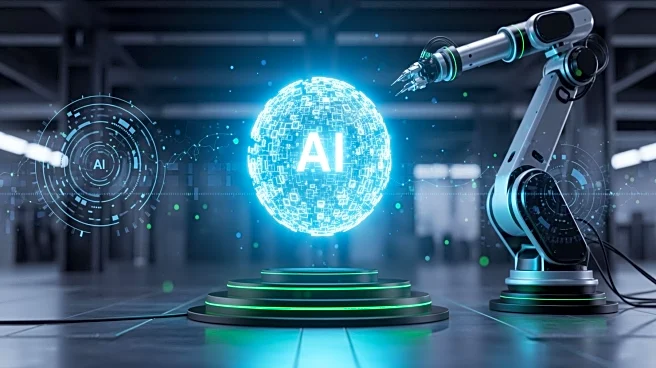What's Happening?
The Manufacturing Data Summit Europe 2025, held in London, brought together industry leaders to discuss the future of manufacturing, focusing on data and AI integration. The summit emphasized the importance
of a robust data strategy to transform raw data into business value. Key discussions included the role of digital technologies, robotics, and net-zero principles in shaping the manufacturing sector by 2035. BMW Group shared a success story of using a digital twin plant platform to catch supplier hardware faults, highlighting the value of centralized data streaming. The summit also explored the concept of data as a revenue driver, proposing internal data marketplaces and servitization models. Cybersecurity was a critical concern, with experts recommending micro-segmentation to mitigate cyber-attack risks.
Why It's Important?
The summit's focus on data and AI integration is crucial for the manufacturing industry's evolution towards efficiency and sustainability. By adopting advanced technologies and robust data strategies, manufacturers can enhance productivity, reduce waste, and create new revenue streams. The emphasis on cybersecurity and diverse teams underscores the need for resilience in an increasingly connected ecosystem. Companies that embrace these changes are likely to thrive, while those that lag may face competitive disadvantages. The discussions at the summit highlight the industry's commitment to building a more adaptive and sustainable future, aligning with global trends towards digitalization and resource efficiency.
What's Next?
Manufacturers are expected to continue integrating AI and data strategies into their operations, focusing on creating value from data and enhancing cybersecurity measures. The shift towards servitization and internal data marketplaces may lead to new business models and revenue opportunities. As the industry moves towards net-zero and digitalization goals, companies will likely invest in technologies that support these objectives. The emphasis on diverse teams suggests a growing recognition of the human factor in digital transformation, potentially leading to more inclusive and innovative workplaces.
Beyond the Headlines
The summit's discussions on data strategy and AI integration may have broader implications for global manufacturing practices, influencing policy and investment decisions. The focus on net-zero principles and resource efficiency aligns with international efforts to combat climate change, potentially driving regulatory changes and industry standards. The emphasis on cybersecurity highlights the growing importance of protecting critical infrastructure in a digital world, which may lead to increased collaboration between industry and government to address these challenges.








